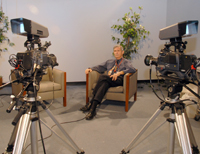|
by Mary Helen Yarborough
Public Relations
Early next year, pharmacists and pharmacy technicians will be able to
obtain continuing education (CE) credits from the comfort of their own
homes, in front of their own computer whenever it’s convenient for them.
The South Carolina College of Pharmacy (SCCP) will launch a web-based
CE service in early 2009, according to SCCP CE director Michael Dunphy.
“This web-based system currently is being utilized by several major
medical centers and the United States Air Force,” Dunphy said. “We are
the first university-based CE program to utilize the system.”
The web-based CE program is being made possible with the acquisition of
a software program called Rx Pharm. It will enable online registration
and tests with immediate results, thereby reducing the paperwork, said
Dana Rosson, administrative assistant. It also will allow SCCP CE
program managers to accept online registration and payment and verify
participation.
“It will provide enduring material programming, which will accommodate
home-study,” Dunphy said. “It will utilize faculty from both campuses
in Charleston and Columbia.”
The program also will help SCCP’s distance learning to extend beyond
the state’s borders, and is expected to reach thousands of pharmacists
and pharmacy technicians nationwide and internationally, Dunphy said.
“Pharmacists and pharmacy technicians from around the state and nation
will be able to go online and take home-study courses from their
pharmacy or home,” Dunphy said. “The participant will be able to hear
the presentation and see the speaker’s slides.”
A CE course catalog of pharmaceutical-related subjects will be developed and made available for purchase next year, Dunphy said.
 The
show’s host, producer and creator Dr. Ronald Nickel sits on the set
that has been used to produce continuing education program for
pharmacists and pharmacy technicians across South Carolina for the past
20 years. The
show’s host, producer and creator Dr. Ronald Nickel sits on the set
that has been used to produce continuing education program for
pharmacists and pharmacy technicians across South Carolina for the past
20 years.
Currently, an average of 350 pharmacists and pharmacy technicians in
South Carolina participate in the two-hour distance-learning CE classes
that are broadcast to 26 sites across the state via closed circuit TV.
SCCP has worked with MUSC’s Educational Technology Services and SCETV
to deliver these live broadcasts four times a year via satellite.
Because these broadcast programs enabled live exchanges between the
show’s host, producer and creator, Ronald Nickel, Ph.D., the classes
met the state’s live-hour course requirement.
The TV broadcast will be phased out, however, and replaced with the
online streaming Webcast, which currently is being used to link
Columbia and Charleston SCCP classrooms every day, said Jeff Osmer,
information systems coordinator for SCCP at MUSC.
The program that began in 1988 has experienced rapid evolution recently with its first streaming Webcast in September class.
“This will accommodate more people needing the flexibility to take
classes online,” said Rosson. “This also will prompt more exchange
between the students and professor, since the questions can be
e-mailed, which is less threatening to a lot of people.”
The web-based materials can be used anytime, easing the juggling act
that these professionals undertake between home and work, Rosson added.
“These classes now are usually held from 7:30 to 9:30 at night so these
pharmacists and pharmacy techs have to find a babysitter and adjust
their personal and professional schedules to take these classes,”
Rosson said.
It’s particularly tough on the pharmacy techs, who do not earn as
much money as pharmacists, but who represent a growing population of
CE-seekers.
Pharmacy technicians must complete 10 hours of continuing education
with four of the 10 hours being live, Rosson said. Pharmacists need 15
contact hours a year to maintain their licenses, six of which must be
live.
Because the average pharmacy is staffed with one pharmacist and an
average of two to three pharmacy techs, the burden would fall on the
pharmacist to operate the entire pharmacy without certified pharmacy
techs, said SCCP spokesman Roby Hill.
“We have been getting more and more requests for classes from pharmacy
techs, and we see a trend in having to expand our CE programs to meet
their growing needs,” Hill said.
Friday, Dec. 12, 2008
|



